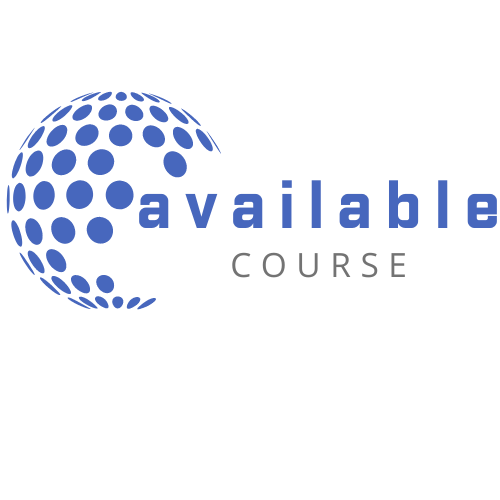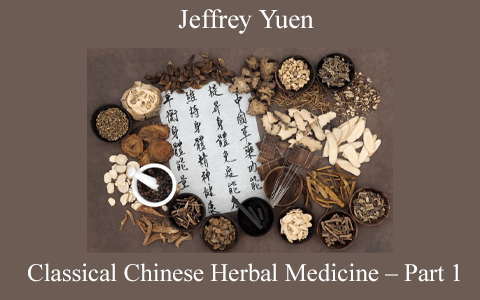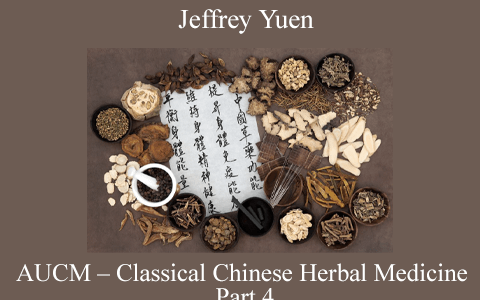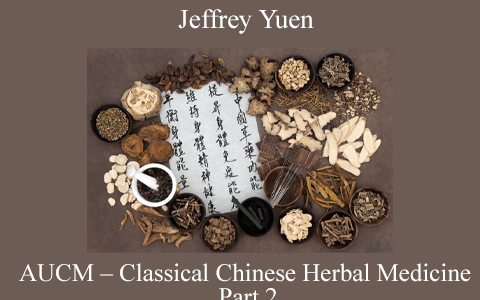AUCM – Classical Chinese Herbal Medicine – Part 3 (16 sessions) aims to convey the principles of herbal medication in a manner that adheres to the most traditional practices. Jeffrey explains that the objective of this course is to impart knowledge about herbs in the traditional fashion— the way in which he himself was instructed.
AUCM – Classical Chinese Herbal Medicine – Part 3 with Jeffrey Yuen Chinese herbal medicine presents itself as an intricate and potent therapeutic method. In today’s society, the conventional methods of introducing Chinese herbal medicine have undergone a process of simplification and streamlining, displaying a notable influence from the Western pharmaceutical paradigm. However, the instruction of herbal medicine did not conform to this approach in earlier times.
Historically, delving into herbalism required a deeper understanding of botanical substances that surpassed mere classification or rote memorization of textual information. The initial stages of the learning process involved developing a profound comprehension of botanical substances. Wherever possible, the apprentice would gain practical knowledge in herb identification and collection, paying meticulous attention not only to the physical attributes of the herb but also to the ecological context in which it flourishes. The apprentice would also consume various herbs and chronicle personal observations about their effects.
While acquiring comprehensive knowledge about each herb was considered crucial, a substantial portion of an apprentice’s time was devoted to observing and assisting the master. Initially, the apprentice would participate in observing the synergistic effects of herbs when combined in various formulations. Similar to how one’s true nature cannot be fully understood until they engage with others, the distinctive characteristics of herbs are revealed through their interactions with other herbs. The same holds true when individuals consume the same herbal combination. The individual serves as a supplementary element within the dynamic environment cultivated through the amalgamation. The cultivation of the skill of herb preparation, also known as pao zhi, occurred simultaneously.
- Classical Chinese Herbal Medicine – Day 1 – Part 1 – Oct. 8, 2021
- Classical Chinese Herbal Medicine – Day 1 – Part 2 – Oct. 8, 2021
- Classical Chinese Herbal Medicine – Day 1 – Part 3 – Oct. 8, 2021
- Classical Chinese Herbal Medicine – Day 1 – Part 4 – Oct. 8, 2021
- Classical Chinese Herbal Medicine – Day 2 – Part 1 – Oct. 9, 2021
- Classical Chinese Herbal Medicine – Day 2 – Part 2 – Oct. 9, 2021
- Classical Chinese Herbal Medicine – Day 2 – Part 3 – Oct. 9, 2021
- Classical Chinese Herbal Medicine – Day 2 – Part 4 – Oct. 9, 2021
- Classical Chinese Herbal Medicine – Day 3 – Part 1 – Oct. 10, 2021
- Classical Chinese Herbal Medicine – Day 3 – Part 2 – Oct. 10, 2021
- Classical Chinese Herbal Medicine – Day 3 – Part 3 – Oct. 10, 2021
- Classical Chinese Herbal Medicine – Day 3 – Part 4 – Oct. 10, 2021
- Classical Chinese Herbal Medicine – Day 4 – Part 1 – Oct. 11, 2021
- Classical Chinese Herbal Medicine – Day 4 – Part 2 – Oct. 11, 2021
- Classical Chinese Herbal Medicine – Day 4 – Part 3 – Oct. 11, 2021
- Classical Chinese Herbal Medicine – Day 4 – Part 4 – Oct. 11, 2021
More courses from this author: Jeffrey Yuen
Course Features
- Lectures 1
- Quizzes 0
- Duration 10 weeks
- Skill level All levels
- Language English
- Students 0
- Assessments Yes




